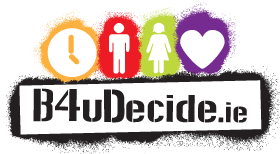B4uDecide.ie is closing down at the end of May 2024.
Alternative sources of relationships and sexuality information and resources:
- For 16-25 year olds: SpunOut.ie is an information provision website, including relationships and sexuality issues.
- For 17+ year olds: Sexualwellbeing.ie is the HSE website that provides information and resources on a wide range of information such as consent, contraception, sexual transmitted infections, vaccinations and unplanned pregnancy
- For parents: The HSE’s ‘Making the ‘Big Talk’ many small talks’ series of booklets to help parents and children talk about relationships and sexuality is available online, and to order free of charge from healthpromotion.ie. HSE funded RSE workshops are available at npc.ie and ifpa.ie
- For teachers: Junior Cycle SPHE Resources are available to support the new 2023 SPHE specification , including the Relationship and Sexuality strand.
- For youthworkers: HSE funded training on relationship and sexuality issues is available at REAL U | Foroige and Tailored Training Courses – National Youth Council of Ireland
‘Coming out’ as LGBT
Coming out is the process through which you accept your sexual orientation and/ or gender identity as being gay, lesbian, bisexual and/or transgender (LGBT).
It is also the process through which you tell others about your sexual orientation or gender identity e.g. family, friends and colleagues.
When you feel like coming out, you might feel stressed, frightened, excited or relieved and it’s okay to feel any or all of these emotions. You will probably be asking yourself: What will people think? How will I tell people? How will my family and friends react?
It is important to take your time and think about whether you are ready to talk about it and who you want to tell. How you decide to come out is up to you. You might tell a close friend first if you don’t feel comfortable telling your parents.
Thinking about coming out:
- Take your time when considering your sexual orientation and gender identity. You might not be fully sure if you are LGBT or straight and that’s okay. You will figure it out.
- Remember there is no pressure on you to come out. Think about whether you are ready to tell someone.
- How you decide to come out is up to you. Some people are very open, while others prefer to be discreet. You might tell a close friend or a trusted adult first if you don’t feel comfortable telling your parents. If you want to talk to someone in confidence about your concerns around coming out you should contact BeLonG To, the national organisation for lesbian, gay, bisexual & trans young people on 01 670 6223 or info@belongto.org
- It might take time for some friends and family to accept you as LGBT. Explain to them that you are not a different person because of this.
- Identifying as LGBT is a personal choice. No one should make you feel ashamed of these aspects of your sexuality.
- For more tips on coming out visit BeLonG To’s website http://www.belongto.org/resource.aspx?sectionid=192
Supporting an LGBT friend:
Supporting a LGBT friend is accepting them for who they are without trying to change them. Your support goes a long way in making them feel comfortable with their orientation and/or gender identity. Below are some things you might do
a. To make it easier for a friend to come out:
o Learn more about LGBT issues so you understand better how you friend might be feeling.
o Talk about LGBT issues and be inclusive so that your LGBT friends will get clues that it would be okay to
come out to you.
o When it is safe for you to do so, challenge people who say bad things about LGBT people.
o Don’t make assumptions about a person’s sexuality. Let them tell you if they want to tell you.
b. To support a friend who has come out:
o When someone has come out, be caring and understanding towards them, be there for them.
o Don’t be too hard on them for not telling you sooner, think about the courage it took to come out.
o Understand that coming out doesn’t mean your friend is a different person, they are still the same, the difference is letting you into their private life.
BeLonG To is the national organisation for LGBT for young people. They have LGBT groups all over Ireland that promote a safe space to come in and chill out, get to know some people and have a chat about what’s on your mind.
Visit www.BelongTo.org for more information or to find a youth group near you.
The above information has been adapted from a number of sources including spunout.ie and BelongTo.org.
